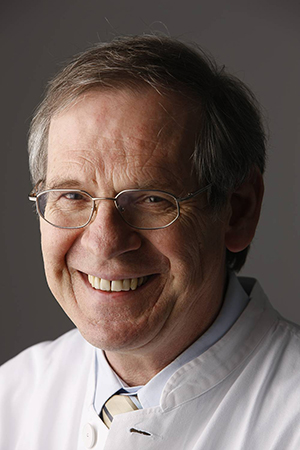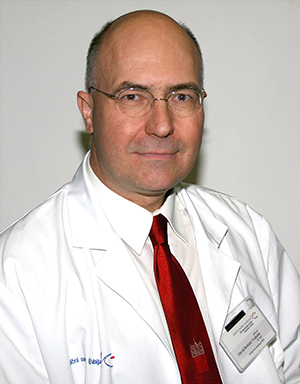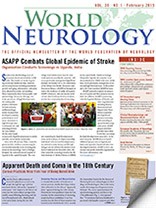
Guenther Deutschl
By David B. Vodušek and Guenther Deutschl
The European Academy of Neurology (EAN) was founded on June 3, 2014, in Istanbul by joint efforts of the two parent societies at their (first and last) Joint Congress of European Neurology, the congress of the European Federation of Neurological Societies (EFNS) and the European Neurological Society (ENS)1. (See also Grisold W, WFN Newsletter http://www.worldneurologyonline.com/article/ens-efns-ean/).
The society is established according to Austrian law, the main goal being to promote “excellence in neurology in Europe.” EAN is a new and vigorous society, which is taking over the good program, functions and initiatives from both parent societies along with the previous EFNS head office in the prestigious Museum District in Vienna, a fine centrally situated “Pentagon” of European neurology, assuring frictionless functioning of the diverse EAN organs.
The bulk of the new group of governing officers, the EAN Board, was elected in June by the hybrid Assembly of Delegates from 45 National European Societies (previously constituting EFNS) and 45 delegates from individual members (elected by the ENS in spring 2013). Prof. Günther Deuschl from Kiel, Germany was elected as president, and the other members of the EAN Board are:
- Vice President: Prof Franz Fazekas, Graz, Austria
- Secretary General: Prof Didier Leys, Lille, France
- Treasurer: Prof Marianne de Visser, Amsterdam, The Netherlands
- Chair Liaison Committee: Prof David B. Vodušek, Ljubljana, Slovenia
- Chair Scientific Committee: Prof Antonio Federico, Siena, Italy
- Member at large: Prof Per Soelberg Sørensen, Copenhagen, Denmark
The Board has taken up the reins immediately, and after a call for applications, Dr. Hannah Cock from London, UK, was chosen as chair of the Education Committee, and Prof. Paul Boon from Gent, Belgium, as Chair of the Congress Programme committee. All committees were replenished with committee members by October 2014, with some members continuing from the previously active EFNS/ENS Committees of same name, and a strong representation of new names from all over Europe.

David B. Vodusek
Europe needs strong leadership in the field of neurology. A recent analysis has found the annual costs for neurological diseases in Europe to be greater than 300.000 Mio €2, and this will increase in the years to come as in Europe the population above 65 years as a fraction of those below 65 years will rapidly increase from less than 25 percent in 2015 to more than 52 percent in 2060 3. The threat of increasing the burden and the costs of disease is the stimulus for politicians to make plans to find solutions, and a chance for EAN to step in and help. The European Commission and the European Parliament have developed programs to support research and development, and over time the amount of money has been steadily increased. The term for the next program “Horizon 2020”4 has begun. The amount of money for Horizon 2020 is almost 80 billion €. Of this money 8 billion € are reserved for health research. EAN is ready to help the 19,000-plus European neurologists to meet the challenges of the burden of neurological diseases and to increase their research efforts to fight them.
EAN is aware of the different national schools of neurology, which have also been exported in the last two centuries to many countries worldwide. These different cultures of practicing neurology will be respected and integrated in EAN. We consider such diversities of neurological cultures to be a strength of European neurology. On the other hand, we move forward together to improve quality of care within all countries, and also to establish minimal standards that can objectively be defined on the basis of sound scientific evidence. Thus, the member societies can use them to negotiate for appropriate financial resources in their respective countries.
It is EAN’s purpose to bring European neurologists together. Berlin 2015 will be our first congress, the program is ready and we believe it will aptly demonstrate the richness and quality of European neurology. Participants from all over the world are most welcome, of course! We will hold our EAN congress annually and all new developments in the field of science and healthcare development as relates to neurology will be covered during these congresses. From 2016 in Copenhagen on, each congress will be dedicated to a certain theme. The scientists of Europe and from all over the world will present new insights and we will recruit our best teachers to have the latest knowledge transferred into clinical practice in the teaching courses.
EAN is reinforcing ties to member societies and is paying much attention to increase individual membership, striving to involve neurologists as individual contributors to developing neurology. EAN has already established closer links to the European Association of Young Neurologists and Trainees (EAYNT), and will make sure that the future generations of neurologists feel represented within the society.
EAN is aware of the important cooperation with UEMS, the representative body of all European specialists at the level of European Union, and is cooperating with its Section of Neurology. The main aims of UEMS are harmonization of postgraduate education, ensuring quality control of education, and delivering care to patients all over Europe. One of the great past achievements of the cooperation between the professional body (Section of Neurology, UEMS) and the scientific society (at that time EFNS and ENS) has been the organization of the European board examination in neurology, which EAN will continue to support.
EAN has also kept the ties previously established by EFNS to the leading voice of neurological patients in Europe, the European Federation of Neurological (patients’) Associations (EFNA), and is already planning coordinated actions aimed at improving patient care across Europe.
Looking back at the short interval since the establishment of EAN much has already been achieved in the past months, thanks to the good preparatory efforts of the parent societies in the past and the ambitious team leading the European Academy of Neurology.
References:
- Bassetti C L, R Hughes. The European Academy of neurology is founded: a fundamental step linking the glorious past with our future challenges. Eur J Neurol. 2014 Jun;21(6):809-813
- Olesen J, Gustavsson A, Svensson M, Wittchen HU, Jonsson B. The economic cost of brain disorders in Europe. Eur J Neurol. 2012 Jan;19(1):155-62
- http://epp.eurostat.ec.europa.eu/statistics_explained/index.php/.
- COUNCIL DECISION of 3 December 2013 establishing the specific programme implementing Horizon 2020 – the Framework Programme for Research and Innovation (2014-2020) and repealing Decisions 2006/971/EC.
